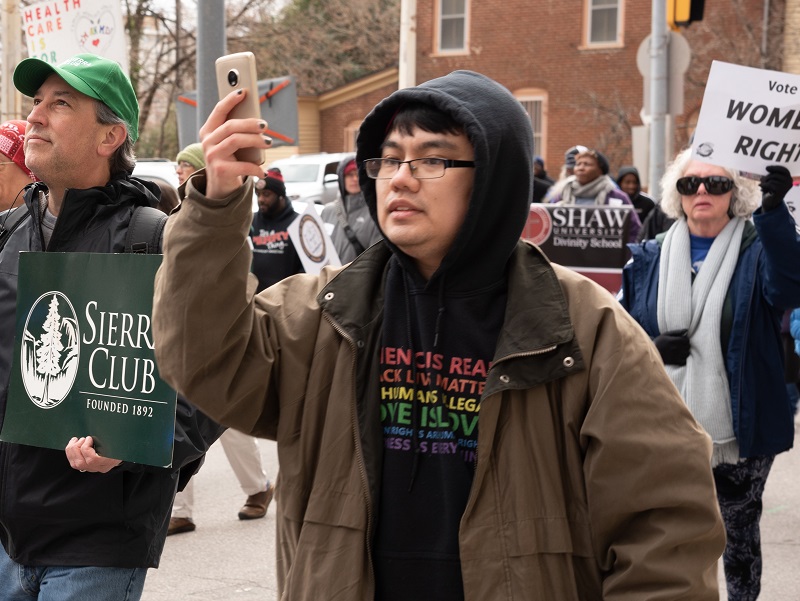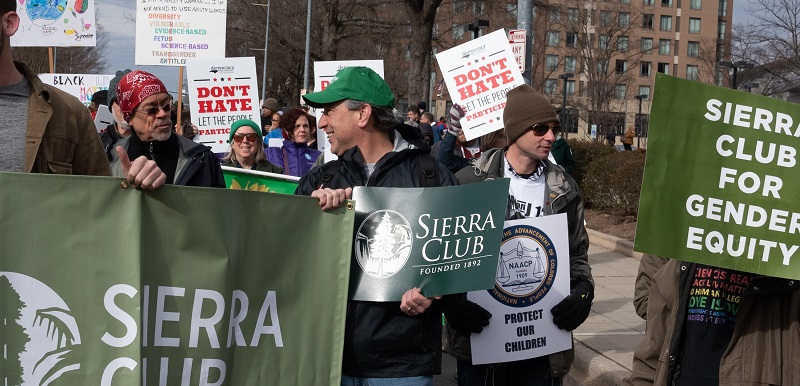By Hwa Huang
Equity, Inclusion and Justice Committee
Sierrans are exploring ways to draw on the unique backgrounds of a variety of people - differences in age, gender, ethnic identity, political beliefs and religious faith - to improve our work to protect North Carolina’s environment.
 The N.C. Chapter’s Equity, Inclusion and Justice Committee (the Equity Committee) provided training during a gathering of volunteers from across the state last weekend. The committee’s 12 members provided insight and ideas on how to broaden the perspectives that inform our activities; that input was distilled into a presentation by committee Co-Chair Grace Levin, who is also chair of the Capital Group.
The N.C. Chapter’s Equity, Inclusion and Justice Committee (the Equity Committee) provided training during a gathering of volunteers from across the state last weekend. The committee’s 12 members provided insight and ideas on how to broaden the perspectives that inform our activities; that input was distilled into a presentation by committee Co-Chair Grace Levin, who is also chair of the Capital Group.
[Photos show Sierrans at the 2019 HKonJ March in Raleigh. By William Blaine.]
About 30 volunteers discussed the concept of privilege and the individual viewpoints each of us bring to our work with the Sierra Club.
We also discussed how Group leaders can incorporate equity frameworks to build a stronger organization, from outings to political advocacy to conservation efforts.. For instance, when we try to save a forest from development, we can ask, “Who will benefit from preserving this open space, and who will be hurt? Are we working with those most affected by the issue and respecting their right to decide what is best for them?”
When we want to know how to recruit more diverse members to our meetings, we can ask “Are we open to different forms of diversity? Do we create conditions that perpetuate harmful power dynamics? How can we be better partners to other community organizations?”
We talked about how people come to environmental advocacy and the Sierra Club from all sorts of backgrounds, how we can be better allies to people from marginalized groups, and how we can to approach partnerships to build transformational movements rather than transactional moments.
This training showed that, in order for the Sierra Club to survive in a society that is becoming increasingly aware of injustices and bigotry, we have a lot of work to do to reach more people on more issues beyond our early core mission of preserving wilderness.
Throughout the workshop, we returned to the question of how social justice relates to environmental work - why the Sierra Club is taking stances on broader issues such as immigration, women’s health and minimum wage.
Let’s address that by looking at one of our core areas of work: protecting public land and green spaces. The Club believes that all people should be able to explore and enjoy nature. But some people don’t have equal access to these places, because they may be unable to leave their home without being afraid for their safety, or because they lack access to transportation or outdoor equipment.

We also know public land is sold and exploited by people with more power and money, so we fight for transparency in political processes to make sure that land remains accessible to everyone.
Environment is intrinsically connected to humanity, so when we fight to preserve public lands, we must also fight to ensure that everyone has the right and opportunity to enjoy them.
Participants agreed that equity needs to be discussed within the N.C. Sierra Club. The workshop gave us a chance to have a long-desired conversation on the subject, speaking candidly and sharing stories about our personal experiences in the Club, both positive and negative.
And at the end of the day, equity work often boils down to this: We support social justice and human rights because it is the right thing to do. The Sierra Club is the oldest and largest environmental group in the United States - a powerful organization that is heard and respected. We must leverage that influence to help people who are suffering.
The Equity Committee is here to help volunteers work through these complicated questions and provide resources to help our Chapter move forward. We know how tough this work is, but our committee members are dedicated to make our organization better by recognizing that all people are affected by our environment, and all people can inform and broaden our work to protect it.
Learn more about the national Sierra Club’s commitment to equity, inclusion, and justice at the Club's website. To learn more about the North Carolina Equity Committee or get in touch with our members, visit the Equity page on this site.